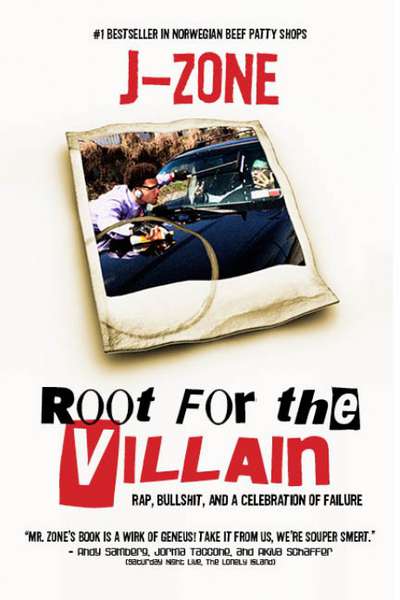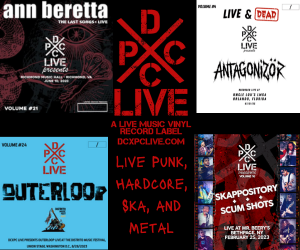In his memoir Root for the Villain: Rap, Bullshit, and a Celebration of Failure, J-Zone, born Jay Mumford, chronicles a lifetime spent playing the lead role in an endless comedy of errors. The brunt of the stories are culled from a decade or so chasing fame and fortune in the rap game. J-Zone, an MC and producer, somehow managed to be too late and too early to party at the exact same time. By the time his records were coming out, the heyday of late ‘90s/early ‘00s hip-hop had gone increasingly underground and the Internet rap world, a place an artist like J-Zone would have made waves, was not yet the taste-making blogosphere it is now. Root for the Villain, in a twist of irony, successfully encapsulates what it’s like to be considered (at least in terms of the music industry) a failure.
A semi-regular contributor at egotripland.com, the online extension of dearly departed Ego Trip magazine, it’s easy to tell that J-Zone has spent some time in blog age, as he is quite comfortable talking about himself. And, well, this is an autobiography after all, so that shouldn’t be surprising, yet its borderline annoying at times how much this is a poor-me story. The self-deprecating tone in which the majority of the book is written tends to lean a little more on the bitter rather than the comical. The author admits this in the introduction: “This collection of memoirs and rants is an extremely opinionated and niche based ride.”
That is not to say there is a shortage of funny and/or entertaining material within’ this book. J-Zone talks about his introduction to sex—or rather, wet dreams—via Darlene; Ice T’s swimsuit clad, gun-toting girlfriend featured on the cover of Power. In another chapter he calls out all the rappers and DJs that owe him recompense for some of the ill-advised decisions he made in his youth. For example, the Afros and No Face owe him money to pay for the Miami Dolphins Starter cap that was ruined by a girl after he rapped some misogynistic lyrics to her that he had heard on their albums. And DJ Premier owes him a new chain because the thugs that tried to snatch his from his neck were reciting Gang Starr’s “Just to Get a Rep” lyrics while doing so.
J-Zone and I have a lot in common. We both immersed ourselves in hip-hop during the Golden Era. We warmly recall a time when gold chains made way for African medallions, Fab Five Freddy, Ed Lover, and Doctor Dre hosted Yo! MTV Raps, KRS-One attacked PM Dawn on stage, and Tim Dog said “Fuck Compton.” As well, both of us moonlight as high school basketball reporters, are annoyed by modern social networking, and are particularly fond of cassette mixtapes. Also, I’m one of the few people that bought his Sick of Being Rich CD. I mention this not simply to interject myself into the story, but rather to illustrate a point: If you don’t have a least some sort of previous familiarity with J-Zone or the era in which he came up in, you might not be immediately drawn to this.
That being said, J-Zone’s tale is a cautionary one that should be heard by any aspiring hip-hop and/or music industry person. Even though you’ve worked alongside Large Professor and Greg Nice, assisted on Grand Puba and Slick Rick projects, and were a paid recording engineer—all while still in high school—it doesn’t mean you won’t get sued by Dolemite over sample clearance or have Fat Beats offer you thousands of your unsold CDs for free before they are destroyed to make room for product by new artists. At the core, the bottom line of Root for the Villain is kind of disheartening: even if it’s something you really want, hard work and dedication doesn’t always pay off. Sans an occasional production credit, J-Zone has long since retired from the industry. Instead of rapping, he has shifted his focus to writing. If this book is any indication, he may have a better chance of success at the latter.


Advertisement



